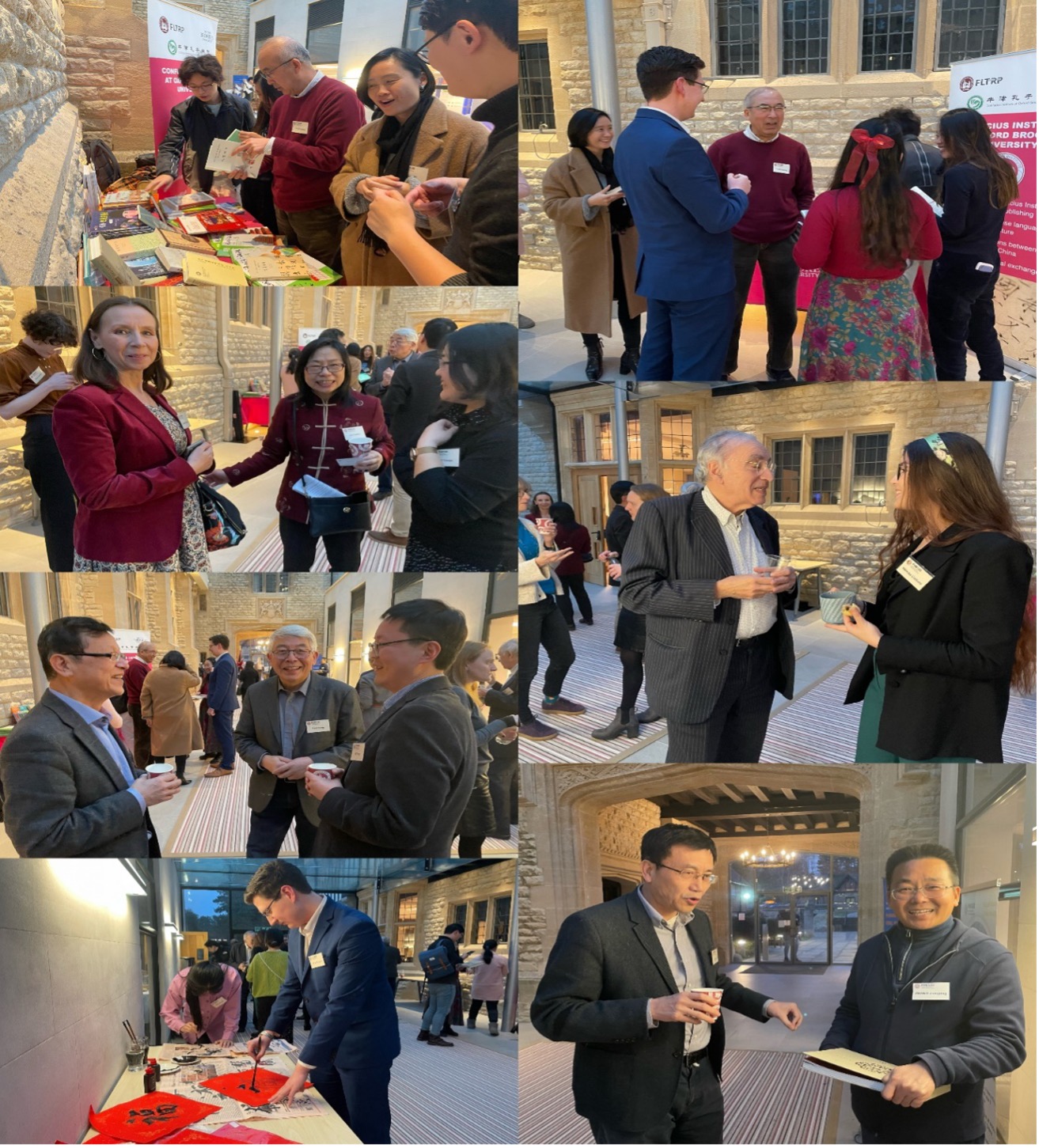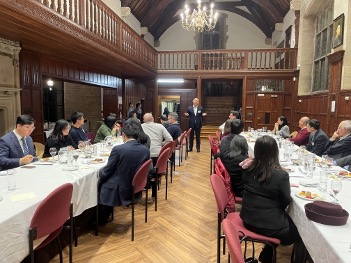On 28 January 2023, PHBS-UK held its 2nd Hongmen Dialogue on Research and Practice of Teaching Chinese as an International Language, attended by almost 130 people via online and on person. The date also coincided with the celebrations of the 7th day of the Chinese New Year – Everyone’s birthday (人日). According to Chinese creation lore, humans were created on the 7th day, and from then on, the Chinese celebrate this day as everyone’s birthday. How more apt can it be to celebrate the Chinese New Year and the birth of humanity with an academic discussion on how to learn and teach another language to better interact and understand each other?
The 2nd Hongmen Dialogue was off to a wonderful start with the announcement and unveiling of the plaque signifying that PHBS-UK is now officially a Chinese HSK Testing Centre, licensed by Chinese Testing International Ltd (CTI) to conduct HSK tests. With PHBS-UK being a testing centre it provides the Chinese language learning community in Oxfordshire and UK with another resource and venue to further their Chinese language study in the UK. With the unveiling of the plaque, it is very apt to have Dr Peize Li, the President and Chief Manager of CTI to kick off the First Plenary Session - Professors’ Dialogue with his talk entitled, “Chinese L2 Education Standards and Tests for Assisting the All-round Development of Chinese L2 learners.
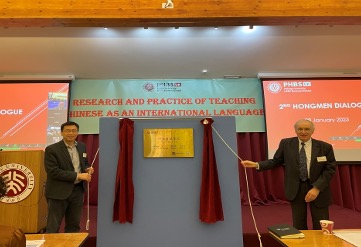
In his talk, Dr Li discussed the evolution of education standards using research cases of Chinese examinations such as the HSK, as well as international Chinese education trends in the post-epidemic era. He also analysed the various changes in international Chinese education standards and examinations. He mentioned that while international Chinese education is facing new advancements in technology such as social media and Artificial Intelligence, the concept of "student-centered" teaching and learning has never changed. Moreover, Dr Li highlighted that Chinese language education has since returned to the father of Education, Johann Amos Comenius' 17th century proposal that education is for everyone and teachers need to focus on students’ natural tendency to learn, making learning through easy stages, and making learning a lifelong journey. We thank Dr Li for kicking off the 2nd Hongmen Dialogue with such a motivating talk about the principles of teaching and learning.
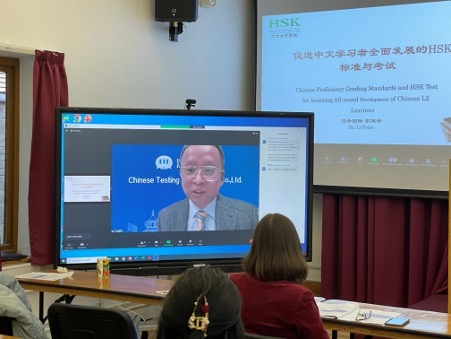
Our second invited speaker in the Professors’ Dialogue is distinguished Sinologist and translator, Professor Luminița Bălan, director of the Confucius Institute at the University of Bucharest. In 2019, Prof Bălan was awarded the “Chinese Government Friendship Award”, a high recognition of her contribution towards the study of the Chinese language by the Chinese government. Thus it is our distinct pleasure to have her with us and talk about “The application of "International Chinese Education Level Standards for Chinese Proficiency" in Romania.” In her talk, Prof Bălan focused on taking the audience through the "Grade Standards for Chinese Proficiency in International Chinese Education", issued by the National Language Work Committee of the Ministry of Education of China, which is applicable to the learning, teaching, testing and evaluation of international Chinese education around the world. Prof Bălan discussed how this versatile document provided the reference for the development of the "Romanian Chinese Teaching Syllabus", a reference document issued by the Ministry of Education of Romania, which is applicable to the teaching, learning and evaluation of Chinese in Romania. Combining the characteristics of both documents, Prof Bălan actively explored in her talk, their application in Romania and how they integrate with each other in the current situation of Chinese education in Romania.
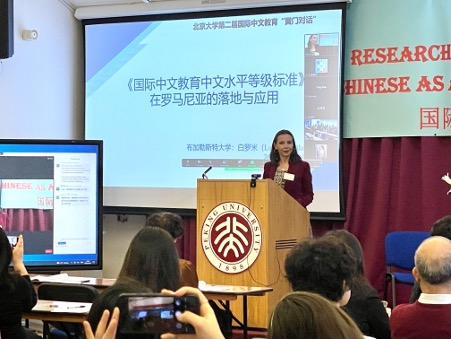
Our final invited speaker is the renowned Sinologist Professor Jöel Ballassen, the first general inspector of Chinese language at the French Ministry of Education. Prof Ballassen was responsible for the development and revision of the Chinese language and examination syllabi in France as well as the assessment and deployment of Chinese language teachers. Thus it is our great honour to have him address our conference with a talk entitled, “Language Proficiency Standards and Testing: Key Issues for Future International Chinese Education”. In his talk, he discussed how in the past few decades, foreign language teaching has entered a new era - taking "language ability" as the basic standard and goal of teaching. Compared with the previous language teaching mode based on "knowledge accumulation", Prof Ballessan highlighted how this was a considerable improvement. However, he cautioned that language teaching is currently facing a second challenge: it must face up to the uniqueness of each language and the distance between languages. On this issue, Prof Ballessan opened the discussion on how the Chinese language occupies a unique position. He questioned whether for European learners, is the Chinese language the same as other languages? Prof Ballessan concluded his stimulating talk with a research challenge for the audience: Develop a test designed to accurately assess the many faces of the Chinese language for the learner.
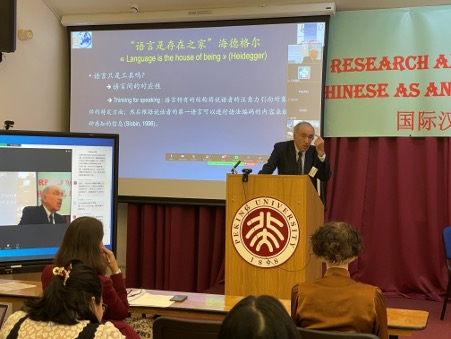
After lunch, the conference attendees reconvened to listen to our first keynote speaker, Professor Katherine Carruthers, the IOE Confucius Institute Director and Pro-Vice-Provost for East Asia at University College London speak on the topic of “Assessment of Chinese in England’s Schools – Challenges and Opportunities”. Prof Carruthers spoke broadly about how Chinese is being assessed in England’s schools and her talk further builds upon the topics and concerns that were brought up by the other professors in the morning’s plenary session. As an expert in the assessment in England, Prof Carruthers was able to bring home the particular challenges of teaching and learning Chinese in GCSEs and A-levels in England such as adequate curriculum time, appropriate teaching training, and the smooth transition between GCSEs and A Levels. Prof Carruthers also discussed the various opportunities available for teachers and learners of the Chinese language such as getting learners to derive success and satisfaction from Chinese language learning. In addition, links with businesses, partner schools in China and the Chinese community in the UK would greatly provide teachers and learners with valuable support in learning about the Chinese culture and acquiring the Chinese language. This is also Prof Carruthers’ second time speaking at our Hongmen Dialogue. We greatly appreciate her continued support of our conference!
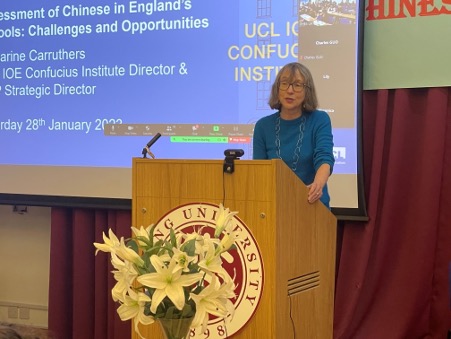
The Second Plenary Session – Teachers’ Dialogue – focused on the views of teaching practitioners. In this year’s session, we had invited 3 teachers: Mr James Stagg, Swire Chinese Centre London Lead and Specialist Leader of Education in the Harris Foundation; Ms Beth Main, Head of Eurasian Studies at Prior Park College, and Ms Siye Li, the Mandarin Subject Lead at Oxford Academy. In this plenary session, the teachers talked about the challenges faced by teachers in encouraging students to learn Chinese, how Chinese is taught alongside other languages taught in the school, as well as the innovative approaches that they have taken to encourage students to learn Chinese.
The second plenary session started with Mr Stagg who talked about “Pinyin, Phonics, and Phonetics in the Chinese Curriculum. In his talk, Mr Stagg explored several approaches to teaching phonics, phonetics and pinyin across the Year 1 – 13 curriculum in the UK. In addition, he also touched on the importance of teaching students the range of sounds that are encountered in Chinese, including some of the ways in which teachers may approach the teaching of pinyin, phonics and phonetics. He also discussed, from a teacher’s perspective, the various advantages as well as the difficulties of teaching the sounds, particularly the symbol-sound relationships. Mr Stagg suggested that when the learners truly understand the relationship between the symbols and the sounds, it will really the benefit the learners in their later study of the language.
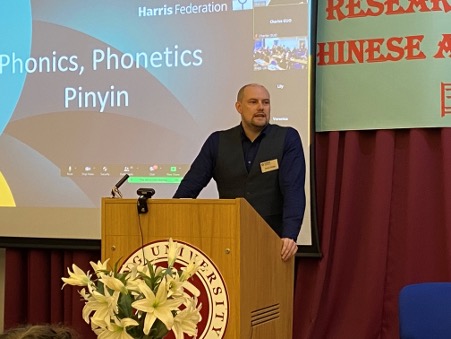
Our second speaker is Ms Beth Main whose talk focused on how the Chinese Language (Mandarin) attracts a lot of students at a young age, however very few of them go on to take it as a subject at GCSE and A Level. She suggested that the main reason for this is the extreme challenge of assessments. Ms Main talked about how students, parents and teachers all recognise that the national assessments currently in place are too difficult - there is too much content to cover in a short period of time, and non-natives cannot get high grades in the same exam as native speakers, which in itself, is a demoralising for non-native speakers. Further, as Ms Main explained, due to a languages curriculum that prioritises European languages over non-European languages, the UK is falling even further behind in our language skills. By trying to align ‘lesser taught languages’, such as the Chinese language, with curriculums and assessments for European languages, students are discouraged and the situation persists. As Ms Main points out this affects Chinese Language acutely at Key Stage 5 due to the lack of an appropriate assessment for non-natives leaving school. Thus, Ms Main suggested that the assessment criteria be re-evaluated, to make it more accessible for non-native learners of the Chinese language.
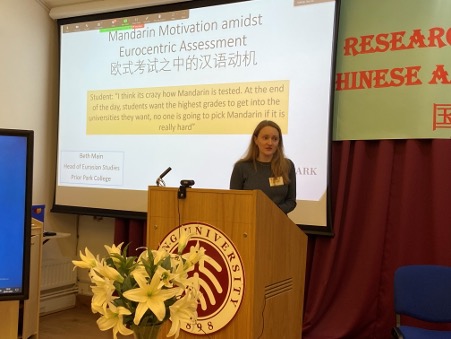
The last speaker of the teachers’ plenary session is Ms Siye Li, the Mandarin subject lead at The Oxford Academy. Her talk was entitled, “Syllabus design, teaching and examination of Chinese writing in the KS3-5 stage of British secondary schools using the language rating framework”. Ms Li discussed and summarised the teaching landscape of Key Stage 3-5 in Chinese subjects focusing on syllabus design, course hours, and assessment within the scope of teaching and learner application of specific writing skills. In her talk, Ms Li focused on the four Chinese language proficiency standards, with particular emphasis on the scoring criteria in vocabulary and grammatical structure when it comes to the teaching and application of writing in Chinese language. She highlighted the various challenges that teachers and students face. Like all the speakers, she suggested that the grading criteria needed to change in order to encourage and motivate more learners to study the Chinese language.
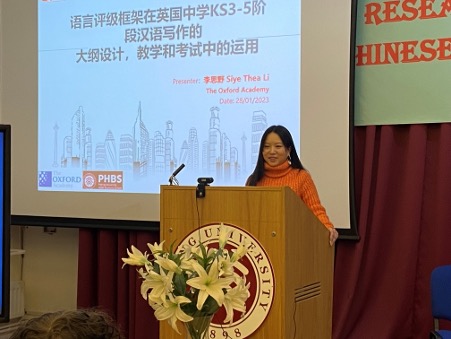
After the teachers’ plenary session, we welcome our second keynote speaker Professor Kent Deng, professor in Economic History at London School of Economics, with a talk entitled “From the Great Divergence to the Great Convergence: China's growth in the past 200 years, 1820-2020”. His talk focused on the rise of the literati in the economic life of pre-modern China, the maritime economic history of pre-modern China, and the economic role of the Chinese peasantry. This is particularly relevant to our Chinese language learners in the audience as they learnt about the path of China’s economic progress, and most importantly the potential that building personal and commercial relationships China would bring.
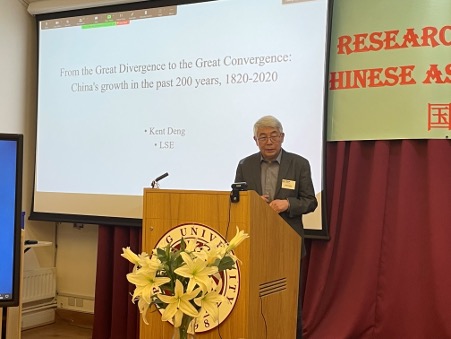
The final plenary session focused on the key stakeholders of the conference – the learners. In this year’s session, we invited Mr Oliver Cotton, a self-taught learner of Chinese language, Ms Torin Audoire, an undergraduate student of French and contemporary Chinese at the University of Nottingham, and Professor Alastair Moore, a computer scientist specialising in AI at University College London and PHBS-UK. The purpose of this session is to invite learners to share their learning journey in the Chinese Language with the teachers and the academics. Mr Cotton shared the tips and strategies he used to teach himself the Chinese language. Ms Audoire shared how she overcame challenges posed by the pandemic during her undergraduate years and how she found help from Chinese speakers online. Prof Moore shared how he used AI in translation and learning Chinese. All these learners presented different methods as well as strategies to learn Chinese language, and they come from all walks of life. They represent our past, present, and future learners of the Chinese language and the message they carry is Chinese language and culture is interesting and they are very motivated to learn and perfect the language.
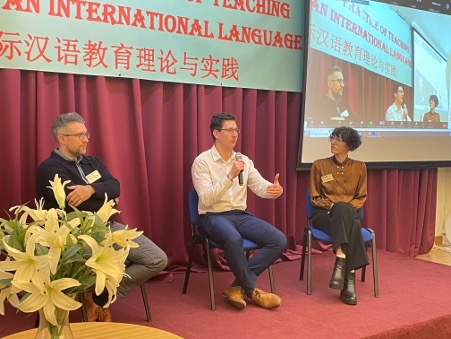
It is with this message that we conclude our 2nd Hongmen Dialogue. We hope that this conference enabled all the academics to share their views and research, bridging the gap between academia and industry. We hope that our teacher practitioners were able to share their teaching strategies with each other and learn from each other. We hope our learners would be more motivated to learn the Chinese language and culture, as well as spread their love of the language to their friends and family encouraging and building a wider community of Chinese language learners and speakers. We thank all our invited guests, distinguished speakers, enthusiastic participants who readily shared their experience and expertise with us. We have learned so much from you. Thank you.
Finally, a huge thank you to our wonderful sponsors, Dr Baoli Zhao and Mr Guang Lin for their generous donation without which this conference would not have been the success that it was.











